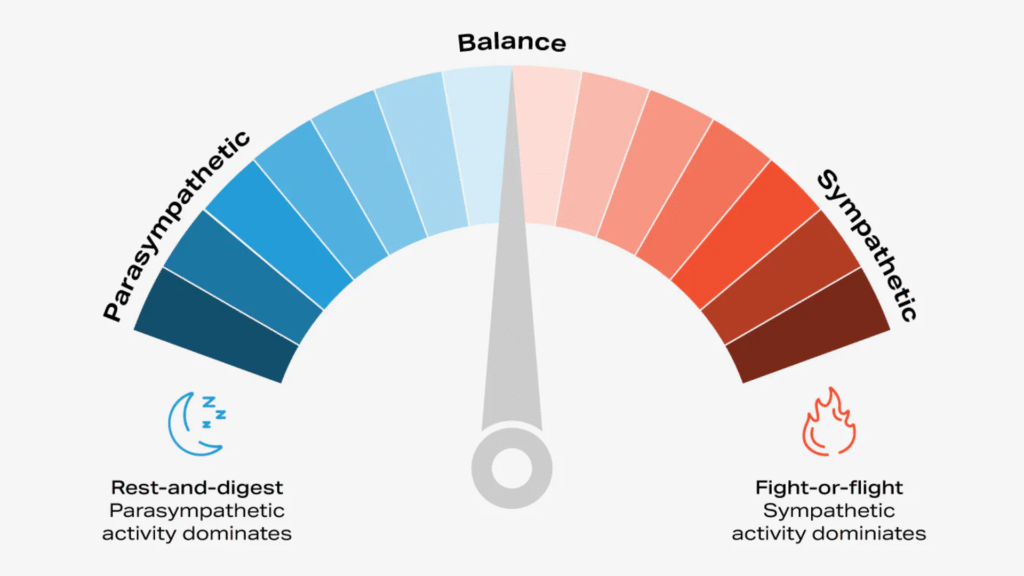- Key Insights: The Link Between Stress and Longevity
- How Stress Affects the Body
- Stress and Longevity in Biological Ageing
- Psychological Stress and Mental Health
- Evidence-Based Stress Management Techniques
- Reducing Stress for a Longer, Healthier Life
- Bringing It All Together: The Agami Approach to Resilience
Key Insights: The Link Between Stress and Longevity
- Stress is a biological cascade, not just a feeling. Short-term stress is adaptive but chronic stress keeps the body’s fight or flight response stuck in overdrive, quietly accelerating ageing.
- The HPA axis and vagus nerve are central players. Chronic activation of the stress response weakens the vagal brake, leading to prolonged cortisol exposure, inflammation and systemic wear and tear.
- Chronic stress accelerates biological ageing. Elevated cortisol, immune dysregulation and oxidative stress erode telomeres, the protective caps on DNA, making cells age faster than your chronological age.
- Immune imbalance drives inflammaging. Long-term stress shifts immune responses towards Th2 dominance, increasing allergies, autoimmunity and chronic inflammation, which are key factors that shorten healthspan.
- Cardiovascular and mental health are deeply affected. Low heart rate variability (HRV), hypertension, anxiety and depression are biological markers of prolonged stress and predictors of reduced longevity.
- Healthy coping mechanisms build resilience. Evidence-based tools such as mindfulness, breathwork, physical activity, time in nature and strong social connections restore balance to the nervous system and protect telomeres.
- Proactive stress management is a longevity strategy. Targeting stress through data-driven personalised techniques helps regulate hormones, support immunity and slow ageing at the cellular level.
We’ve all been there. The alarm blares after a restless night, your email inbox is already overflowing, and the day has barely begun. Your heart rate quickens, your shoulders tense up, and a familiar sense of dread settles in. This is stress, our constant modern-day companion.
But what if I told you that this feeling isn’t just in your head? It’s a profound biological cascade that, when left unchecked, can quietly chip away at your lifespan.
Stress isn’t inherently evil. Short bursts of stress are important for survival.

The “fight-or-flight” response that helped our ancestors dodge sabre-toothed tigers is the same one that helps you slam the brakes to avoid a car accident. This is a powerful adaptive mechanism.
The problem arises when the tiger never leaves. In our world of constant deadlines and notifications, stress often remains in the “on” position. This change turns stress from a life-saving tool into a cause of faster aging. Understanding the link between stress and longevity is the first step toward reclaiming control over your health span.
How Stress Affects the Body
To understand how to manage stress, we first need to appreciate the elegant, albeit sometimes destructive, biology behind it. When your brain sees a threat, like a physical danger or a scary work presentation, it triggers a reaction. This reaction involves your nervous system and hormonal system.
The Symphony of Stress: Cortisol, Fight-or-Flight, and the Vagus Nerve
The command centre for this operation is the HPA axis (Hypothalamic-Pituitary-Adrenal axis), a sophisticated communication network between your brain and adrenal glands. The sympathetic nervous system first sounds the alarm. It fills your body with adrenaline, getting you ready for action. This is your classic fight-or-flight mode.
Following closely behind is the master stress hormone, cortisol. Think of cortisol as your body’s chief of emergency resources.
It fills your body with glucose for a quick energy boost. It sharpens your focus and reduces non-essential functions. This helps save resources for the immediate crisis.
But this is only half the story. The body has a built-in braking system: the parasympathetic nervous system, often called the “rest-and-digest” system.
The major nerve that carries these calming signals to your body is the vagus nerve. It is a large highway of nerve fibres that goes from your brainstem to your gut (amongst other places). When the body activates the vagus nerve, it slows your heart rate, promotes digestion, and dampens inflammation.

A healthy, well-functioning nervous system can switch flexibly between these two states. Chronic stress, however, weakens the “vagal brake,” leaving the fight-or-flight accelerator floored.
When the stress becomes chronic, cortisol shifts from being a helpful emergency manager to a problem player. Continuously elevated cortisol levels can lead to insulin resistance, weight gain, a weakened immune system, and cognitive fog. Over time, these effects directly impact stress and longevity, as the very systems designed to save you begin to dismantle your long-term health from the inside out.
The Immune System on Edge: Inflammation and Autoimmunity
One of the most damaging effects of chronic stress is how it disrupts your immune system , a key factor in the connection between stress and longevity. This can lead to long-term inflammation. Initially, cortisol suppresses immune activity to save energy. But chronic exposure dysregulates the immune system.
This leads to a critical imbalance in your T-helper cells, the generals of your immune army. In a healthy body, Th1 cells fight viruses. Th2 cells deal with parasites and allergens.
There is a balance between these two types of cells. Chronic stress and elevated cortisol suppress the Th1 system, causing a shift towards Th2 dominance.
This isn’t just a subtle tweak; it has profound consequences. A Th2-dominant state can lead to an increase in allergies and asthma.
This chronic, low-grade inflammation, often referred to as “inflammaging”, accelerates cellular wear and tear. Combined with increased oxidative stress, it creates an internal environment that undermines healthy aging. This is where stress and longevity intersect most powerfully: prolonged immune dysregulation shortens healthspan, increases the risk of age-related diseases, and accelerates the aging process at the cellular level.
Stress and Longevity in Biological Ageing
Chronological age is the number of birthdays you have had. Biological age shows the real health and strength of your cells.
Chronic stress is a strong cause of biological aging. Its effects can be seen deep in our DNA.
The Role of Telomeres on Stress and Longevity
At the end of each of our chromosomes are protective caps called telomeres. A great analogy is the plastic tip on a shoelace that prevents it from fraying. Every time a cell divides, these telomeres get a little shorter, acting as a kind of cellular clock.
Here’s the crucial link: chronic stress dramatically speeds up this process. The relentless exposure to cortisol, inflammation, and oxidative stress directly erodes telomeres. Studies have shown that individuals experiencing chronic psychological stress have significantly shorter telomeres than their less-stressed peers, effectively making them biologically older. Agami Health explores how telomeres influence longevity and their importance in healthy aging.
Impact on the Cardiovascular System
Your heart and blood vessels are on the front lines of the stress response. Every time your sympathetic nervous system fires, your heart rate and blood pressure spike. When this happens day in and day out, it takes a toll, creating a clear link between stress and longevity.
Chronic stress contributes to hypertension and an increased risk of heart attack and stroke. A key metric here is heart rate variability (HRV), which measures the variation in time between each heartbeat. A high HRV reflects a strong “vagal brake” and a resilient nervous system. In contrast, low HRV marks chronic stress, signaling that your body remains in a state of high alert. Over time, these cardiovascular changes highlight how stress and longevity are closely connected through heart health and nervous system resilience.
Psychological Stress and Mental Health
The connection between the mind and body is not a philosophical concept; it’s a biological reality. Stress creates a psychological burden that closely connects to the physiological processes governing mental health and aging.
Anxiety, Depression, and Longevity
Chronic anxiety and depression are physical conditions. They are marked by problems in the HPA axis. These issues lead to high cortisol levels and ongoing inflammation, similar to other stress-related disorders.
This biological chaos shows why these mental health issues are strong risk factors for accelerated ageing. They can lead to heart disease, dementia, and a shorter life. Addressing mental health is not a secondary concern for longevity, it is fundamental.
Coping Mechanisms That Shorten vs. Extend Life
How we respond to stress is just as important as the stressor itself. Unhealthy coping methods, like drinking alcohol or eating sugary foods, may give short-term relief. However, they make the problem worse by increasing inflammation and metabolic issues.
Healthy coping mechanisms help reduce stress. They protect your body and support a longer, healthier life.
Evidence-Based Stress Management Techniques
The good news is that we are not passive victims of our stress response. We can actively train our nervous system to become more resilient. The key is to find good stress management techniques. These techniques can strengthen our “vagal brake” and help our body relax.
Mindfulness and Meditation
Meditation and mindfulness are perhaps the most direct way to counteract the fight-or-flight response. These practices train you to shift your attention into the present moment.
Biologically, this is a workout for your parasympathetic nervous system. Techniques like slow, diaphragmatic breathing directly stimulate the vagus nerve, telling your body it’s safe to stand down.
Regular practice can lower cortisol levels. It can also reduce inflammation markers. Additionally, it increases heart rate variability (HRV). It may even boost the activity of telomerase, an enzyme that protects telomeres.
Physical Activity and Relaxation
Exercise is a form of beneficial, acute stress (hormesis) that builds resilience against chronic psychological stress. It helps your body become more efficient at handling and clearing stress hormones. Mixing this with relaxation methods like yoga or time in nature creates a strong way to fight chronic stress.

Building Resilience Through Social Connection
Humans are social creatures, and meaningful connection is one of our most powerful buffers against stress. As recognised by organisations like the British Psychological Society (BPS), social isolation is a major health risk.
Positive social interactions release oxytocin. This hormone helps create bonds and reduces the effects of cortisol. Building resilience is a team sport.
Reducing Stress for a Longer, Healthier Life
The message is clear: chronic stress is not just an unpleasant feeling but a fundamental driver of the ageing process. It dysregulates our hormones, skews our immune system towards autoimmunity, damages our DNA, and compromises our mental health. But the power to change this trajectory lies within our hands.
By understanding the biology of the stress response, from the HPA axis to the Vagus Nerve, we can consciously implement strategies to manage it. This isn’t about eliminating stress but about building the resilience to navigate it gracefully.
This philosophy is key to our work at Agami Health. Our main goal is to guide you on your journey to resilience and longevity. We believe in empowering you with the tools and insights for longer, healthier living.
By using practices that strengthen your vagus nerve and balance your immune system, you can protect your cells. This also helps calm your nervous system and slow down the aging process. If you’re ready to take control of your health, explore how we support stress reduction for longevity. Your future self will thank you for it.
Bringing It All Together: The Agami Approach to Resilience
The science gives a clear message: how we handle stress is key to living longer. Not a soft, secondary aspect of health, but a powerful biological force that dictates the pace at which we age.
Chronic stress and longevity are closely linked, as stress affects many parts of our body. It impacts the HPA axis, our immune system, and the vagus nerve. It even changes the length of our telomeres. The signs of chronic stress are all around us.
Ignoring it is like trying to build a strong house on a crumbling foundation. True healthspan extension isn’t just about the food we eat or the exercise we do; it’s about mastering the interplay between our mind and our body’s intricate cellular machinery.
At Agami Health, this deep understanding is the cornerstone of our philosophy. We don’t just offer generic advice to “relax more.” We use a data-driven, systems-biology approach to understand your unique stress signature.
Our goal is to move beyond mere management and towards genuine resilience, providing you with a personalised toolkit of evidence-based strategies to regulate your nervous system, rebalance your immunity, and protect your cells from accelerated ageing.
These strategies will help you regulate your nervous system.
They will also help rebalance your immunity. Finally, they will protect your cells from aging too quickly. This is the future of proactive health, a guided journey to a longer, healthier, and more resilient life.
